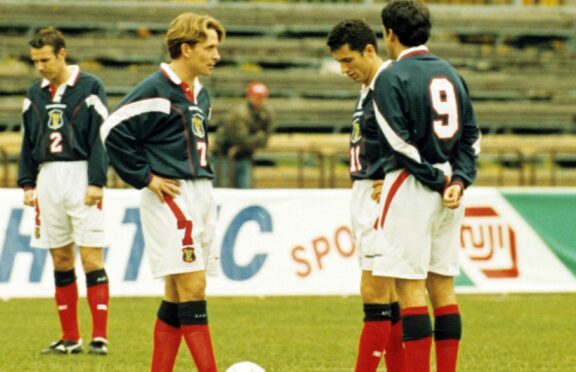
Hidden away in the midst of all the midweek club action was a pleasing teaser of international excitement to come.
Scotland’s eagerly-anticipated World Cup play-off against Ukraine at Hampden Park is now just six weeks away, and it was announced Supporters Club members had shattered first-day sales records, with more than 22,500 four-match bundles sold inside 24 hours.
Given the less-attractive nature of the package – the Nations League visits of Armenia, Ukraine (again) and the Republic of Ireland later in the year – that is some going.
It was partly down to some smart marketing. Offering four games for around £100 – when there would be many who would willingly pay plenty to see the play-off alone – is a policy that stands to benefit everybody.
Buyers get to go to the game they really want to see, get value for their purchase, the Scottish FA’s coffers are bolstered and Scotland manager Steve Clarke is guaranteed decent support for contests that would hold less-obvious appeal.
The other big factor is the form of Clarke’s side.
Everybody loves to back a winner, and the country ended 2021 with six victories on the spin.
True, the Euros did not go as hoped. If the fighting draw against England at Wembley was something to be proud of, the twin Hampden losses to the Czechs and Croatia were a source of disappointment.
However, by making it back to a major tournament Finals, the players changed the way they felt about themselves, and the way the nation viewed them.
The performances in the World Cup qualifiers since have provided evidence of an increased self-belief that bodes well for what looks a testing pathway to Qatar.
To reach the competition showpiece for the first time since France 98, Scotland will have to beat Ukraine, and then the winners of another semi-final between Wales and Austria, away from home.
You need only think of the performances for Wales in recent years of Gareth Bale and Aaron Ramsey – who also made headlines during the week – to see the real danger there.
Ukraine, meanwhile, are ranked 13 places above Clarke’s men in the FIFA Rankings.
Their effort of reaching the quarter-finals in the 2006 Finals is impressive compared to Scotland’s record of never having got out of the first round.
They do, of course, have more to occupy their minds just now than just football.
Russian President, Vladimir Putin, has amassed tens of thousands of troops along the border the countries share, sparking fears an invasion could be imminent.
Were that to happen – and it is a pressing concern for several Western countries – the ability of Ukraine to fulfil the tie would be thrown into doubt.
As much as it would not be the way anyone would wish to progress in a sporting event, failure to honour the fixture would see Scotland go forward.
Memories of “One team in Tallinn” in 1996, when Estonia failed to turn up for a World Cup qualifier against us over a dispute about floodlights, comes to mind.
Of more concern to the Scottish FA right now is the Scotland Women’s World Cup qualifier in the Ukraine on April 8, the countries having been coincidentally drawn together.
As with the men’s team, they are continuing to monitor the situation very closely.
Sport has a way of just getting on with things, and Russia and Ukraine actually competed against one another in the UEFA Futsal tournament on Friday.
It is not impossible that a Russian invasion would KO the March 24 tie at Hampden.
Clarke, far too wily a campaigner to worry about things outwith his control, will be focusing on assembling the strongest squad he can, and having them as well prepared as possible.
To that end, he will have been delighted to see Callum McGregor get through the Old Firm derby safely in midweek.
Playing with a mask to protect an injury he suffered at Alloa, the Celtic captain came back early to help his team at a time when they were without Tom Rogic, Nir Bitton and David Turnbull.
With the same game featuring positive contributions from both McGregor’s team-mate, James Forrest, and Ryan Jack of Rangers, it was a timely reminder not all of Scotland’s key men are based south of the border.
It now looks as if the Ukraine test is going to come too soon for Turnbull, who has been out with a hamstring injury since limping off in the Premier Sports Cup Final in December.
However, just as Celtic’s playing resources have allowed them to cope in the 22-year-old’s absence, so the strength of Scotland’s midfield options should mean it is not as big as problem as it would have been had, say, the likes of Che Adams been sidelined.

Enjoy the convenience of having The Sunday Post delivered as a digital ePaper straight to your smartphone, tablet or computer.
Subscribe for only £5.49 a month and enjoy all the benefits of the printed paper as a digital replica.
Subscribe © Rob Casey / SNS Group
© Rob Casey / SNS Group